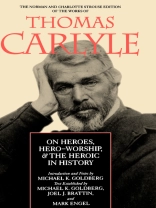In his 1840 lectures on heroes, Thomas Carlyle, Victorian essayist and social critic, championed the importance of the individual in history. Published the following year and eventually translated into fifteen languages, this imaginative work of history, comparative religion, and literature is the most influential statement of a man who came to be thought of as a secular prophet and the ‘undoubted head of English letters’ (Emerson). His vivid portraits of Muhammad, Dante, Luther, Napoleon—just a few of the individuals Carlyle celebrated for changing the course of world history—made On Heroes a challenge to the anonymous social forces threatening to control life during the Industrial Revolution.
In eight volumes, The Strouse Edition will provide the texts of Carlyle’s major works edited for the first time to contemporary scholarly standards. For the general reader, its detailed introductions and annotations will offer insight into the author’s thought and a reconstruction of the diverse and often arcane Carlylean sources.
Mục lục
List of Illustrations
Preface
CONTENTS
Chronology of Carlyle’s Life
Introduction
Note on the Text
On Heroes, Hero- Worship, and the Heroic in History
Lecture I. The Hero as Divinity
Odin. Paganism: Scandinavian Mythology
Lecture II. The Hero as Prophet
Mahomet: Islam
Lecture III. The Hero as Poet
Dante; Shakspeare
Lecture IV. The Hero as Priest
Luther; Reformation: Knox; Puritanism
Lecture V. The Hero as Man of Letters
Johnson, Rousseau, Burns
Lecture VI. The Hero as King
Cromwell, Napoleon: Modern Revolutionism
Appendix: 1858 Summary and Index
Notes
Works Cited
Textual Apparatus
Emendations of the Copy-Text
Discussion of Editorial Decisions
Line-End Hyphens in the Copy-Text
Line-End Hyphens in the Present Text
Historical Collation
Index
Giới thiệu về tác giả
Michael K. Goldberg is Professor of English, University of British Columbia. He has written widely on the 19th century including Carlyle and Dickens (Georgia, 1972). Joel J. Brattin is Assistant Professor in the Humanities at Worcester Polytechnic Institute. Mark Engel is a student of philosophy, a professional editor, and an independent scholar.












